- Home
- Gail Godwin
The Finishing School Page 14
The Finishing School Read online
Page 14
And the letter was perfect, especially the way she had phrased that part about the favorite and unfavorite colors. It was a letter that even Aunt Mona could read without suspecting she had been betrayed by me in that diatribe about my room.
I got up at once and placed the little bottle in my window, where it caught the morning light and began to “assert” itself. It drained power from the muddy hues of my walls and flattened the smiles of the milkmaids with its clear, twinkling blue. I kept looking at it as I got dressed. Now it did not seem a strange present to me at all, but a magically appropriate gift. She had sent me a talisman to ward off ordinariness and compromise and despondency. It was just what I needed, this bottle, and I liked it all the better because its significance would be known only to her and to me.
VI.
“Ursula DeVane sent me a bottle,” I told my mother at breakfast.
“A bottle?” repeated my mother, puzzled. “What kind of bottle?”
“Just a little blue bottle she saw in an antiques shop,” I said, purposely nonchalant. “It reminded her of me because I think I said I liked the color blue. But it was nice of her to remember my birthday. It’s the thought that counts, after all.”
“Of course it is,” agreed my mother. “It’s very kind of her to take an interest in you.” Did I detect a relief in her voice that the gift had not made a great hit with me? “I know you’ll be sure and thank her for it,” she added.
After I had finished a leisurely breakfast of buckwheat cakes and bacon, my mother said, “I’ve got something for you, too. It’s down in my room. I’d rather give it to you here than carry it over to the houseboat.”
“Is it something huge?”
“No, not huge,” she said, smiling. “But I’d sure hate to see them drop over the side of the houseboat into the water. Besides, it’s something that belongs just to the family; I don’t want to give it to you in front of all the others.”
“First you said ‘it,’ and then you said ‘them.’ How can it be both?”
“Well,” she said, “come on downstairs to my room and I’ll show you how.”
In the last few weeks, she had made a corner of her room into a little office. Mr. Mott had lent her a fairly new IBM electric, with typing stand and chair, and my mother was now teaching herself to touch-type from a boring manual Aunt Mona had found for her. She was determined that, come September, when Jem started school, she would be proficient enough to get a job as somebody’s secretary. “Though no one will hire me, probably, without shorthand, too,” she had said to Aunt Mona. “Nonsense,” my aunt had retorted, “they’ll take one look at you and see you’ll be an asset to their office. With your looks and your luck, you probably won’t even have to type.” “My luck, Mona? I hardly see how you can call me lucky, after all that has happened.” “Now don’t be offended, Louise. I know you’ve had an awful time. First your parents and then poor Rivers, after he’d got through the war without a scratch on him. No, what I meant was, you have this quality—I have always noticed it in you, even way back when we were kids and I could only gaze at you from the other side of the tracks—” “Oh, Mona, I do wish you wouldn’t speak in that way. You make out as if you and Rivers were some kind of slum children and I was this awful snob.…” “No, let me finish, Louise. I always noticed this quality in you, this attitude. It was the attitude of someone who had been brought up to expect the best. And when you expect the best, you get the best, that’s my theory. People see something in you and respond to it. Some lawyer or businessman in Kingston is going to take one look at you when you walk in his office, and say, ‘That lady has an air about her, and I want it for my office; it will reflect well on me.’ ” “Well, for the sake of my children, I hope you are right, Mona,” my mother had said good-humoredly.
Jem was now seated at the typewriter, pecking out lines of gibberish. “You know what?” he said. “If I keep on practicing every day, I’ll be able to type just as good as anybody by the time school starts.”
“Darling, they won’t have typewriters at your school,” said my mother. “But I’ll bet you’ll be able to read as well as anybody else in your grade. At least we’ve managed that, these last few months. I’m going to give Justin her present.”
“Aren’t you going to wait for the party?” Then he clapped his hands over his mouth, fearing he’d given the surprise away.
“It’s all right. She knows there’s going to be a little celebration. But I wanted this to be just among us.” My mother opened the top drawer of her bureau and handed me a long, slim box, wrapped in festive paper.
They sat down on the bed beside me while I slipped off the ribbon and undid the Scotch-taped edges without tearing the paper. Inside a brown velvet case I found a pearl necklace that I had known all my life: my grandmother’s. Many thoughts rushed through my head as I sat there simulating the awe I knew I was expected to feel. Since I had been a little girl, I had been told that this necklace would one day be mine. Often, as my grandmother fastened it around her neck, she would tell me how this had been a wedding present from my grandfather, and that, since my mother had received a pearl necklace all her own for her high-school graduation, this one would be mine. “And, just between you and me,” my grandmother would say, “these are far better pearls.” I had always admired the necklace, but was quite willing to wait for it. I had known that it would not be mine until my grandmother died, and she was more important to me than any pearls. But I also connected it with becoming a woman, and I had had ambivalent feelings about this inevitable transformation ever since, as a little girl, I had believed that when you became a woman you grew long fleshy appendages on the bottoms of your feet so you could wear high heels. The high heels looked nice and sounded authoritative as they clacked over wooden floors, but to wear them, I thought, I would have to forfeit my comfortable flat soles on which it was easy to run and play. Though I no longer believed in these sprouting appendages, I still felt unready to inherit these pearls, to look in the mirror and face the young woman fastening them around her neck. I knew I must turn into that young woman within a few years, but something in me held back: there was a lonely, mysterious side of myself I was just beginning to know, a side neither masculine nor feminine but quivering with intimations of mental and spiritual things. I had to save a place for these things. If I let myself be rushed into womanhood with all its distracting appurtenances, I might miss their quiet revelations and be a less interesting person for the rest of my life.
“Of course, you won’t want to wear them just yet,” my mother said, “but I thought you ought to have them. She always meant for you to have them, you know.”
“I know.”
“Would you like to try them on?” my mother urged.
“I thought you said I shouldn’t wear them yet.”
“I only meant you wouldn’t want to wear them to school or anything. But you can try them on now.” She took them from the box and held them out to me.
“Oh, then I’d love to,” I said, with convincing enthusiasm. I bowed my head and let her fasten them around my neck.
“And remember,” Jem told her, “I get my grandfather’s gold watch when I’m older. And his stethoscope.”
I couldn’t wait for them to have their nap that afternoon. I wrote a note (“Gone for a bike ride. I may stop by Ursula DeVane’s and thank her. Love, Justin”) and anchored it to the kitchen table with Aunt Mona’s Scotty dog salt and pepper shakers. I liked the way my handwriting looked with the new Greek e’s, and the bold crossing of the t in “Justin.” It would have looked even more dramatic if I had been able to slash on through the t in “Stokes,” as well, but I could hardly sign a note to my mother “Justin Stokes.”
As soon as I rode away from our house, I felt larger, freer. I was almost certain she would be expecting me today. Why hadn’t I gone back sooner? More than two weeks had passed since the tea. Part of the reason was shyness, but there was a calculated frugality in it: I didn’t want to use up my welcome; I
wanted her to miss me a little. But she had been real and present to me every day. I had taken her with me to various places and thought her thoughts while there. Her personality had already penetrated mine.
I rode down the haywagon road and left my bike at the edge of the forest, just out of sight, so nobody would be tempted to steal it. Then I went softly through the woods toward the hut; I whistled a few tuneless bars of something so she would not feel I had crept up on her again.
She was not in the hut, though her clothes lay in a heap on the blanket. Her thong sandals were there, too, the toe of one stepping on the toe of the other, as though she had slipped them off in haste.
To go for a swim? Then why was there nobody in the pond? “Ursula?” I called timidly. The sound of my voice calling her name sounded presumptuous; it reminded me emphatically of the vast difference in our ages. But where was she? The sunlight pouring down through the shafts of the pines seemed suddenly sinister, the way it sparkled on the slight agitations of that pond with nobody in it. In the space of a second, I imagined her drowned or in the process of drowning somewhere on the bottom of the pond. In my imagination I had already torn off my tennis shoes and plunged straight down, overcoming my horror of all the things below that dark surface; I felt my way through the muddy depths for the crumpled form I must somehow, quickly, every breath counting, pull to the top. I would have to give her artificial respiration the way we had been taught in Girl Scouts. But the people we had practiced on had always been clothed. Hadn’t she said she swam naked? How would she feel when she revived and found me kneeling over her naked body, blowing air into her mouth? But what if she didn’t revive?
I was still paralyzed by embarrassment and indecision when she shot up out of the water, laughing and sputtering.
“I haven’t done that in years!” she cried exultantly. She flung herself backward into the water with a splash and floated, regarding me with a wet grin. She was wearing a bathing suit. “I must have been under a whole minute, at least!” She looked extremely pleased with herself.
“I was imagining you’d drowned,” I said, resentful of her childish mirth.
“That’s the whole point.” She raised her head out of the water and squinted at me, then laughed. “Oh, Justin, if you could see your face. You must be careful with that face. Everything shows on it. I’m sorry I teased you, but I couldn’t resist. I heard you coming through the trees and I thought: I wonder if my breath’s as good as it once was. And it was! Once, Abel Cristiana and I got so good at this, we staged a double drowning. We had poor Julie in tears when we finally came up. Oh God, we were all so young then. Now look at us: feuding and looking the other way when we meet. I hope you brought your suit today. I brought mine specifically to protect your sense of modesty.”
“No,” I said. “I really can’t stay very long. I only came to thank you for the bottle.” I sounded stiff and ungracious. “I really did like it,” I added.
“I’m glad,” she replied, breaststroking around the pond with her head held up in a formal way. “It was nothing very much, but I wanted you to have it.” She seemed offended. It occurred to me then that she had hoped I would come, had looked forward to a long visit. The idea that I could wound her gave me a little thrill of superiority, and at the same time made me relent.
“I guess I can stay a while,” I said, “as long as I’m not disturbing you.”
“Not at all. Julie is interviewing two prospective pupils. Two brothers. I preferred to amuse myself down here rather than making chitchat with the mother. But it will be much nicer if you will stay and amuse me.” She smiled at me from the water, and I thought: She knows everything that has been passing through my head; she knows I know she was waiting for me, but she’s still in command. Her humor gives her a command I don’t have. Even if someone did hurt her, she would probably smile that funny smile that always starts with the twitching of her lips, as if she’s trying to keep it back, and then she would say something that would keep her in control.
“Well,” she said, “if you won’t come in, I’m coming out. My fingertips have shriveled.” She did a show-offy backward somersault and came up with her hair streaming behind her like a mermaid. With several brisk strokes she reached the edge and hauled herself up the muddy bank. She wore an old woolen tank suit, one of those shapeless garments that remind you of school swimming classes, and I could see her stiff nipples sticking up beneath the wool. She had a lean, long-waisted body with broad shoulders and not very much bosom. Her legs were shapely, but I saw with the cruel eye of the young that the tops of her thighs were flabby.
Aware I was giving her the once-over, she immediately turned the tables on me, as she would always do when I was harboring criticisms. “Is it that you can’t swim?” she asked, tossing back her head and wringing her wet hair with both hands. “Because I would be happy to teach you. It would give us a worthwhile project for the summer.”
“I’ve been swimming since I was three years old,” I said (which was an exaggeration; it was nearer to six); “I went to the beach every summer with my grandmother and she taught me to swim.”
“Ah, then it must be that you just don’t like country ponds,” she said, stepping inside the hut. “You imagine all the creepy-crawly things in a pond, whereas”—I could hear her stripping off her wet suit—“an ocean has its own collection of sting-y, prickly things: jellyfish, crabs, sea urchins …” She laughed softly as she reeled them off. “I’d just as soon take my chances with the inhabitants of this pond; I’ve swum with the great-great-grandparents of every frog and turtle and water snake in it.…” She popped her head around the door and winked at me. “Just joking about the snakes, of course. Oh hell, I forgot my towel. Well, I’ll have to make do with this old blanket.” Sounds of energetic rubbing came from behind the door. “I was in a rush to get out of the house before those boys arrived with their mother. She would have expected me to give her a tour of the house. They all want a tour of the house.”
She emerged from the hut with the exuberant superiority of an athlete joining a sedentary friend. “If you can stay a while, we’ll go up to the house and get your other present as soon as Julie’s finished. The first time, he only does little tests, to find out how musical they are—or aren’t. It’s a bit dog-eared and faded, but we thought it might inspire you, under the circumstances.” She strode over to a tree and slung the wet suit across a low branch.
“I guess I can,” I said. “I just have to be back for this surprise supper or something they’re giving me on my uncle’s houseboat. I’m not supposed to know about it, but my mother told me. She gave me my present earlier because it was just a family thing. I got my grandmother’s pearls.” I thought this sounded impressive.
“Oh my,” said Ursula, sitting down on the cracked stone threshold of the hut. She motioned me to sit down, too. “That must have been quite an occasion. You admired your grandmother, didn’t you?”
“Everyone admired her. My grandfather used to say she was the only woman he knew who would behave exactly the same way when nobody was looking.”
“My God, what a thought!” said Ursula. “Does that mean she was so sure of who she was that she never had to pretend, or was it a way of saying she had no private life?”
“I think he meant she was just good,” I said uncertainly. Nobody before had ever questioned my grandfather’s encomium. That Ursula seemed to find something questionable about it put me on the defensive.
With her characteristic quickness she saw that she had come close to profaning a family paragon and made amends by saying she had never known her grandparents on either side. “Father didn’t marry until he was almost fifty. His parents were already dead, and, as he couldn’t stand my mother’s people, we never saw them. Our mother’s family was from Albany. Father met her when he was serving his one term in the state senate. It was his first and last foray into government: he couldn’t wait to come home, where he could run things his own way without having to have a majority. He ha
d known my mother for only a short time when he asked her to come back to Clove with him as his bride. She was barely twenty. I’ve often imagined how it must have been with them: he taken in by her youth and shyness and beauty, and she dazzled by his greater authority and position in the world. Of course, when they got back to Clove it was a disaster. She didn’t fit in here, she realized she could never be her husband’s equal, and she pined away in loneliness and boredom. Father really shouldn’t have married at all; he was too critical of people. I’m the same way, I’m not marriage material either.”
I had never heard anyone speak so dispassionately of their own parents. “But if your father hadn’t married, you wouldn’t be here.”
She narrowed her eyes, paler than usual from the swim in the cold pond; her freckles stood out. It was fascinating and disconcerting that she could look like different people from minute to minute. With her wet, curly, uncombed hair and the sharp nose and the freckles, she looked like an urchin just now; in the water, her hair streaming back, her face tip-tilted to the sky, she had been a mermaid; at tea, with the dark lipstick and the green dress, she had been a formal older woman.
“I’m not so sure,” she said mysteriously. “I’m not so sure I wouldn’t be here, in some form or other, even if Father had never met our mother. I sometimes fancy that I am the living spirit of this family, reincarnated generation after generation since the ancient days of our ancestors, the Sires DeVeine, whose ruined fortress I visited in France. In those days, the name was spelled v-e-i-n-e. Veine means luck in French. Coup de veine: stroke of good luck. Pas de veine: rotten luck. C’est bien ma veine: just my luck. Sometimes in these incarnations I’m a man; sometimes a woman. Sometimes I’m rich, other times poor—like now. Sometimes I die quietly and happily in bed, a large and loving family gathered around me; other times I come to a violent end alone.” She said all this in an amused chant; I couldn’t tell for sure whether she was teasing or not.

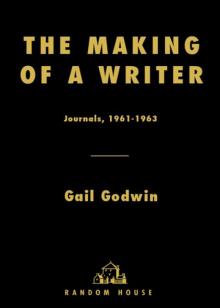 The Making of a Writer
The Making of a Writer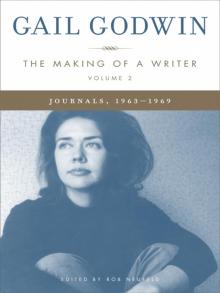 The Making of a Writer, Volume 2
The Making of a Writer, Volume 2 Old Lovegood Girls
Old Lovegood Girls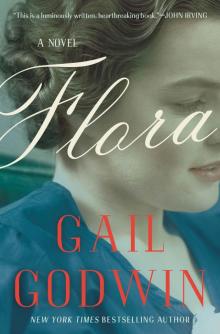 Flora
Flora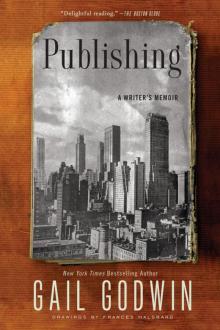 Publishing
Publishing The Finishing School
The Finishing School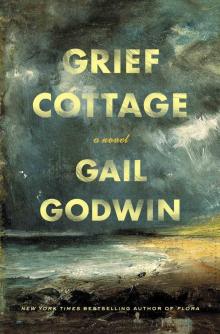 Grief Cottage
Grief Cottage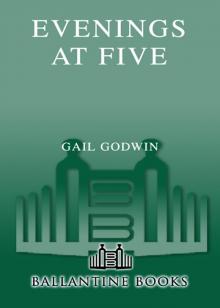 Evenings at Five
Evenings at Five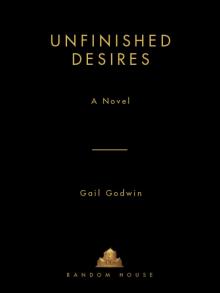 Unfinished Desires
Unfinished Desires